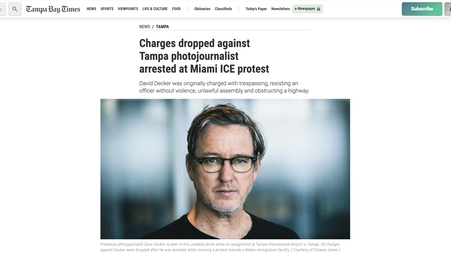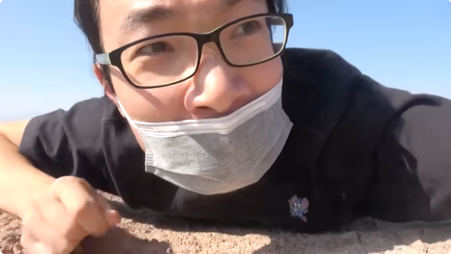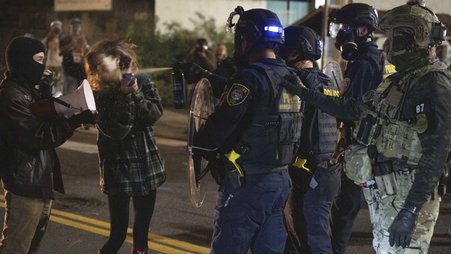The immigration raid protests that began on June 6, 2025, in Los Angeles and spread to other cities across the U.S. have shown, once again, that protests are one of the most dangerous places for journalists in America.
As of today, the U.S. Press Freedom Tracker has documented more than 20 press freedom incidents involving journalists covering protests in California, most of them instigated by law enforcement, and is investigating numerous others in California and other states.
Demonstrations have lessened recently, but they’re likely to resume as the Trump administration continues to push unpopular immigration raids in Democratic cities. Journalists — as well as protesters — remain vulnerable.
When the police detain, assault, and attack journalists covering protests, it can prevent them from reporting the news and the public from learning about newsworthy events. That’s why we all must condemn police attacks on the press and take action to stop them in the future.
If you don’t want to see the authorities abuse journalists and the First Amendment during protests, here are five things you can do to help.
1. Support local journalism.
Many of the journalists covering recent protests have been freelancers or reporters for smaller, local outlets. They could undoubtedly use your financial support. In recent years, many local news sources have struggled or even shuttered completely because they simply can’t make enough money to support themselves.
Your monetary support is what keeps the lights on and pays for the journalists who report from protests. Consider buying a subscription to news outlets that are sending journalists to cover protests in your community, or subscribing or donating to freelance journalists.
In Los Angeles, journalists for the small news outlets L.A. Taco and The Southlander have faced press freedom aggressions while covering recent protests, as have freelancers like Joey Scott. Journalists at commercial broadcasters like KTLA, KVEA, and KNBC, and larger outlets like the Los Angeles Times, The New Yorker, CNN, and the New York Post have also experienced press freedom incidents.
If you can’t support local outlets monetarily, you can also contribute to them through letters to the editor and op-eds making clear that you value their work and want them to be able to report safely. Even social media posts and reposts help.
2. Support injured journalists and journalists’ legal defense funds.
In addition to providing financial support to news outlets, individual journalists injured by law enforcement could use your help, as could the legal defense services that assist them.
For example, independent photojournalist Nick Stern suffered a severe injury at the recent LA protests. Stern is recovering from emergency surgery after being shot in the leg with a crowd-control munition. His friends started a GoFundMe campaign to help cover his medical bills.
In addition, The Intercept, in partnership with CalMatters and the National Press Photographers Association, has launched a rapid response fund to provide financial help for emergency medical support, among other costs, for journalists covering protests in LA.
Other journalists will need legal help to respond to unjustified arrests. The Intercept’s rapid response fund can be applied to legal expenses, as can the Society of Professional Journalists’ Legal Defense Fund. Both groups accept donations.
Another organization you may want to support is the Los Angeles Press Club, which, with help from another group worthy of your donations, the First Amendment Coalition, is suing local law enforcement for violating journalists’ First Amendment rights.
3. Film or record attacks and arrests of journalists, if it’s safe to do so.
Of course, financial support isn’t the only way you can help. If you witness law enforcement arresting or attacking journalists covering a protest and it is safe for you to do so, you should consider recording the incident.
Creating a record of journalists’ arrests and assaults can help hold police accountable. Publishing videos or photographs deters misconduct by bringing negative attention to police. Recordings, pictures, and witness statements can also be useful in future lawsuits. So, if possible, you should give copies of your recordings and contact information directly to the journalist or their news outlets.
Even if you see others recording, your recording may capture a useful angle that rebuts false narratives. For example, in this video an officer adamantly accuses ABC’s Matt Guttman of having provoked an altercation by “touching” him, but this video shows that it was the officer who pushed Guttman, who, at most, reflexively grabbed the officer’s arm to steady himself after being assaulted.
The public has a First Amendment right to record police in the performance of their official duties in public, including at protests. Of course, the existence of that right doesn’t necessarily mean it’s safe to exercise it. Police have been known to attack or arrest people who film them or take their pictures, and other laws may allow police to require non-journalists to disperse or move back. You should assess your personal risk and the laws in your jurisdiction before deciding to take pictures or videos of police arresting or attacking journalists.
4. Submit requests for public records and bodycam footage.
Even if you can’t document police action against journalists at protests while they’re underway, you may be able to unearth valuable documentation after the fact using public records requests.
If your state classifies bodycam footage as a public record, requests for police body-worn camera footage from protests could be particularly useful. (Even if your state does not consider bodycam footage a public record, you may be able to request it under a specific provision in state law governing such footage.) In the past, bodycam footage has shown police targeting journalists at demonstrations or ignoring reporter’s statements that they are press.
You don’t have to be a journalist to submit a records request. Organizations like MuckRock have easy-to-follow tools and guidance for submitting and tracking requests, and examples of requests from others that you can crib from.
5. Call on lawmakers to end qualified immunity.
Finally, one of the reasons that police feel emboldened to violate First Amendment rights of both protesters and journalists is because they know they can get away with it. A legal doctrine known as qualified immunity often protects police and other government officials from civil claims that they’ve violated a person’s constitutional rights. Police have invoked qualified immunity in cases brought by journalists alleging violations of their First Amendment rights, sometimes successfully and sometimes not.
After the police murder of George Floyd in 2020 and the subsequent Black Lives Matter protests, many called for an end to qualified immunity. Unfortunately, that reform effort has largely stalled.
Today, a few states ban or limit the ability of the police to invoke qualified immunity. Congress has introduced, but not passed, a bill to end qualified immunity. If you don’t want police to be able to attack protesters and journalists with impunity, contact your state and federal representatives and tell them to end qualified immunity.
What all five of these ideas have in common is that they call on you to exercise your First Amendment rights to protect journalists who are using theirs. Whether you’re supporting journalists’ work, documenting abuses, or contacting your representatives, your voice matters. With your help, journalists can and will continue to report the truth.





